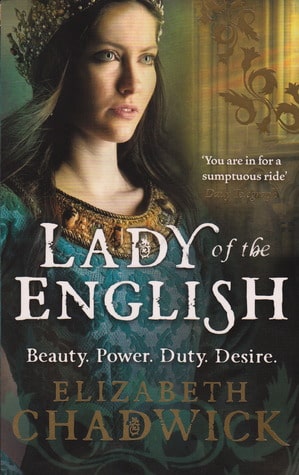
Review of Lady of the English by Elizabeth Chadwick, historical fiction based on the life of Henry I’s daughter, Matilda, set in 12th century England and France.

This post may contain affiliate links, which means I may receive a commission, at no extra cost to you, if you make a purchase through a link. Please see our full disclosure for further information.
Synopsis
Following the death of her husband, Empress Matilda returns to her father’s court in England. As he has no surviving legitimate sons, King Henry is making plans and back-up plans for the succession. Part of these plans involve marrying Matilda to Geoffrey, Count of Angou. Matilda is almost twice Geoffrey’s age and sees him as little more than an insolent puppy.
Then Henry dies. Matilda’s cousin Stephen swoops in to take her father’s crown before her supporters can act. United by the need to secure their sons’ futures, Matilda campaigns for England while Geoffrey fights in Normandy. Will they succeed? Can Matilda win back the crown her father promised her?
Review
Of course, anyone who knows the least bit of Medieval English history knows how the story ends. Stephen holds on to the crown until his death, at which point Matilda’s son Henry becomes king. I liked how the author ended the book where she did, at the point where Matilda leaves England and her son comes to the fore of the story.
I like how Lady of the English shows Matilda in a different light to how she is usually seen. Historically, Matilda is thought of as proud, demanding, and overbearing. Book-Matilda is brave, intelligent, and frustrated at not being taken seriously just because she’s a woman. This makes her fascinating and likeable.
She looked round at the menfolk of her family and knew they would never understand, much less want to do so. That her place was above theirs, that she was the only one born of a ruling king and queen, was cause for envy, not worship. Had she been male, she could have led the discussion about to begin without a second thought. As it was, although she was a figurehead, they did not expect her to contribute to the dialogue, any more than they expected her to gird on a sword and don a mail shirt. Geoffrey was here with his army, amply fortified by the two thousand marks Stephen had given to him the previous year. He wanted to talk tactics with Robert, not her.
The author, Elizabeth Chadwick, does a great job of plausibly filling the gaps in the historical record. She really transported me into the 12th century. I appreciated how well she stuck to historical fact; for example, there is an opportunity to sensationalise the story with a possible affair between Matilda and one of her supporters, but the evidence is sketchy and she instead shows Matilda as devoted to God and her family. The book seems really well researched, though I’m not so sure about her use of akashic records.
The ending had me crying my eyes out (this seems to happen a lot these days). For so long, Adeliza had longed for children and once she finally had a family, she had very little time with them before she became unwell and had to leave. It is so sad.
Conclusion
Have you read Lady of the English? What did you think? Do you agree with what I’ve said about it? Let me know in the comments.